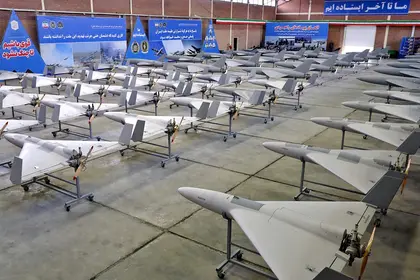A Russian plant in Alabuga plans to produce 6,000 Shahed attack drones annually, the Wall Street Journal (WSJ) reported.
Russia’s deepening ties with Iran and more African states are evidenced by the manufacturing operation for the Iranian-designed drones. The operation, located in hangars in the Alabuga Special Economic Zone on a tributary of the Volga River, highlights the collaboration. As per WSJ’s report, Russian business executives secured the deal to build the drone plant there in late 2022, offering $1.7 billion, partly in gold bars, to Iran.
JOIN US ON TELEGRAM
Follow our coverage of the war on the @Kyivpost_official.
This was confirmed by US security officials and revealed in February by a hacker group called the Prana Network, which infiltrated email servers associated with Iran’s Islamic Revolutionary Guard Corps.
The contract, leaked by the Prana Network and independently corroborated by two British government advisers, specifies that the Alabuga facility will produce 6,000 Shahed attack drones annually, along with surveillance drones.
By the end of April, the factory was ahead of schedule, having already supplied 4,500 Shaheds, according to the International Institute for Strategic Studies, a London-based defense think tank.
Russian soldiers are training to operate the drones in Syria, with instructors from the Revolutionary Guard and Hezbollah, according to WSJ, citing Ukrainian military intelligence and a former Syrian officer from conflict-monitoring group Etana.

Russian Spy Ship Spotted Off British Coast – UK Defence Secretary
Russia now produces its warheads, speeding up production, said Henry Thompson, a former plant employee and drone expert who has analyzed debris found in Ukraine, concluding that newer Shaheds were made in Russia.
WSJ’s report disclosed that Moscow’s drone production is supported by Tehran’s logistics networks and military technology. Iran’s network of front companies, often based in places like Hong Kong or Dubai, has enabled them to evade Western sanctions. The US has blacklisted many of these firms, but they adapt quickly, creating new companies.
An Iranian front company in the UAE, Generation Trading FZE, played a role in Russia’s drone project, selling drone models, spare parts, and ground stations to Russia. This company was sanctioned by the US Treasury in February.
The facility’s official purpose was to produce boats, as per the contract with Sahara Thunder, another Iranian entity sanctioned in April for being a front for Tehran’s defense ministry.
To meet its production goals, Russia needed skilled workers. Initial production relied on students from nearby technical colleges, but there weren’t enough of them. Consequently, the manufacturers began recruiting workers from Africa.
Russia recruits Ugandan women at its plant in Alabuga
Early last year, as per WSJ’s report, Russian businessmen from the Alabuga Special Economic Zone held a recruitment event at an upscale school in Kampala, Uganda. They offered young female students skilled jobs with triple the average Ugandan wage, free airfare, accommodation, and a university diploma as part of a work-study program.
Some recruiters, including Ugandan schoolteachers and administrators, quietly contact former students with the right skills. Joseph Kazibwe, a recruiter and deputy headmaster at a secondary school in Lubiri, said that the Russians are interested in young women who excel in science subjects. Kazibwe mentioned he was unaware the jobs involved building drones.
“Our job is to identify and reach out to suitable candidates,” he said.
According to Kazibwe, the Russians take full charge of the process after the initial identification of suitable candidates and do not share their recruitment criteria, leaving the local recruiters without knowledge of how and who they eventually select.
Since then, over a thousand women from Africa have gone to the Alabuga Special Economic Zone, with another thousand expected this year, according to Ugandan officials.
Promotional videos from Alabuga show students skating through corridors to techno music. The salary is nearly $1,000 a month, almost double the average Russian wage.
Other footage shows an African woman at the site, in a hazmat suit, assembling “Albatross” reconnaissance drones. Kampala officials confirmed that recruits are used to assemble unmanned aerial vehicles.
Dozens of M3 “Albatross” reconnaissance drones produced at the Alabuga plant have gathered detailed photographic intelligence on Ukrainian positions and movements at the front line, according to the WSJ. The manufacturer stated that these drones have already assisted in repelling an attempted Ukrainian incursion into Russia’s Belgorod border region.
Since the start of the war in Ukraine, Iran has transferred weapons stocks to Russia, including kamikaze drones, and artillery and tank ammunition. Iran has transferred the technology that allows Russia to manufacture analogs of the Shahed kamikaze drones in Alabuga, Tatarstan which was targeted by Ukraine’s own long-range drones at the beginning of April.
According to Western intelligence sources, Iran reportedly agreed to supply ballistic missiles to Moscow in early 2024 – although no such transfer has been recorded yet.
You can also highlight the text and press Ctrl + Enter










